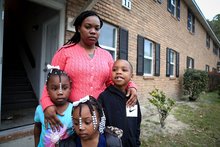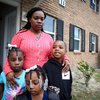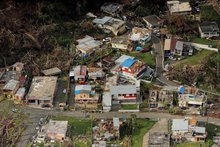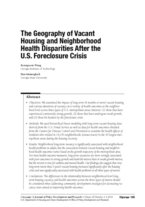0
News Article
Community: Youth
Jun 29, 2017
One Summer Chicago Plus is a jobs program designed to reduce violence and prepare youth living in some of the city’s highest-violence neighborhoods for the labor market. This study was carried out over the summer of 2013 in partnership with the Chicago Department of Family and Support Services. It found that the program, which provided a six-week, minimum-wage job for 25 hours a week, reduced the number of violent-crime arrests for participants by 33 percent over the subsequent year. The One Summer Chicago Plus 2013 study—accompanied by a long-term follow-up of the 2012 program—closely examines the two to three years following the six-week program and finds that the reduction in violent-crime arrests is not driven simply by keeping participants off the streets during the summer. In fact, the decline in violence remains significant when the summer is ignored entirely.
Researchers did find, however, that the program had no significant impacts on schooling outcomes or engagement, nor did it have a positive impact on formal labor sector employment for all of the participants after the fact. The authors do note that it is possible that significant labor market effects will develop past the three-year window examined in the study.
Authored by: UNIVERSITY OF CHICAGO URBAN LABS
Topics: Child welfare, Community development, Criminal justice, Out-of-school time, Partnerships, Preventative care, Safety, Youth
 Shared by Housing Is
Shared by Housing Is
Housing Is posted a
on Oct 15, 2020
UNIVERSITY OF CHICAGO URBAN LABS
One Summer Chicago Plus is a jobs program designed to reduce violence and prepare youth living in some of the city’s highest-violence neighborhoods for the labor market. This study was carried out over the summer of 2013 in partnership with the Chicago Department of Family and Support Services.
0
News Article
Community:
Mar 27, 2019
A shortage of affordable housing on this island territory has forced hundreds of families to remain in damaged and leaky houses during the lengthy recovery effort. The widespread destruction of hotels and public housing, combined with the flood of workers who have rushed to the islands to aid in rebuilding, have pushed rents higher, beyond the means of many disaster victims.
Authored by: Tim Craig for The Washington Post
Topics: Community development, Housing, Low-income, Safety, U.S. Territories
 Shared by Housing Is
Shared by Housing Is
Housing Is posted a
on Apr 2, 2019
Tim Craig for The Washington Post
A shortage of affordable housing on this island territory has forced hundreds of families to remain in damaged and leaky houses during the lengthy recovery effort.
0
News Article
Community:
Mar 12, 2019
The proposed bill follows an NBC News investigation that found at least 11 public housing residents had died of carbon monoxide poisoning since 2003.
Authored by: Suzy Khimm for NBC News
Topics: Funding, Health, Housing, Legislation & Policy, Safety
 Shared by Mica O'Brien
Shared by Mica O'Brien
Mica O'Brien posted a
on Mar 14, 2019
The proposed bill follows an NBC News investigation that found at least 11 public housing residents had died of carbon monoxide poisoning since 2003.
0
Research
Community:
Feb 5, 2019
Housing is considered a social determinant of health, with poor housing conditions being associated with poor health. Veterans with disabilities are more likely to experience a housing crisis because of combat experiences and employment instability. We identified facilitators and barriers to finding and maintaining rental housing. We sought to understand the housing needs of Veterans with military-related disabilities using the biopsychoecological model (BEM) as an organizing framework.
Authored by: Semeah, Ahrentzen, Cowper-Ripley, Santos-Roman, Beamish, and Farley for Housing Policy Debate
Topics: Disabilities, Funding, Health, Homelessness, Housing, Legislation & Policy, Research, Safety, Seniors, Stability
 Shared by Housing Is
Shared by Housing Is
Housing Is posted a
on Mar 14, 2019
Semeah, Ahrentzen, Cowper-Ripley, Santos-Roman, Beamish, and Farley for Housing Policy Debate
Housing is considered a social determinant of health, with poor housing conditions being associated with poor health. Veterans with disabilities are more likely to experience a housing crisis because of combat experiences and employment instability.
0
News Article
Community:
Mar 1, 2019
Residents of a South Carolina public housing complex are demanding answers after two of their neighbors died from the gas.
Authored by: Suzy Khimm and Laura Strickler for NBC News
Topics: Housing, Legislation & Policy, Low-income, Safety
 Shared by Mica O'Brien
Shared by Mica O'Brien
Mica O'Brien posted a
on Mar 7, 2019
Suzy Khimm and Laura Strickler for NBC News
Residents of a South Carolina public housing complex are demanding answers after two of their neighbors died from the gas.
0
Research
Community:
Nov 1, 2018
In this study, researchers conduct a literature review across public health, environmental health, medical, sociology, and urban planning journals to synthesize the research on the mental health effects of rat infestations on residents living in urban neighborhoods.
Authored by: Kaylee Byers, Chelsea G. Himsworth, and Raymond Lam for The Journal of Environmental Health
Topics: Health, Housing, Low-income, Mental health, Research, Safety
 Shared by Housing Is
Shared by Housing Is
Housing Is posted a
on Feb 28, 2019
Kaylee Byers, Chelsea G. Himsworth, and Raymond Lam for The Journal of Environmental Health
In this study, researchers conduct a literature review across public health, environmental health, medical, sociology, and urban planning journals to synthesize the research on the mental health effects of rat infestations on residents living in urban neighborhoods.
0
News Article
Community:
Feb 4, 2019
The U.S. territory needs to urgently tackle issues such as "widespread informal housing" and "the exorbitant amount of abandoned spaces" as it rebuilds after Hurricane Maria.
Authored by: Nicole Acevedo for NBC News
Topics: Community development, Food insecurity, Funding, Homelessness, Housing, Legislation & Policy, Nutrition, Safety, Stability, U.S. Territories
 Shared by Housing Is
Shared by Housing Is
Housing Is posted a
on Feb 4, 2019
Nicole Acevedo for NBC News
The U.S. territory needs to urgently tackle issues such as "widespread informal housing" and "the exorbitant amount of abandoned spaces" as it rebuilds after Hurricane Maria.
0
News Article
Community:
Jan 29, 2019
Housing complex would integrate residents with special needs into the larger community
Authored by: Tara Bahrampour for The Washington Post
Topics: Disabilities, Dual-generation, Housing, Mental health, Place-based, Safety
 Shared by Housing Is
Shared by Housing Is
Housing Is posted a
on Jan 31, 2019
Tara Bahrampour for The Washington Post
Housing complex would integrate residents with special needs into the larger community
0
Research
Community:
Sep 1, 2018
Systematic analysis of health care complaints can improve quality and safety by providing patient-centered insights that localize issues and shed light on difficult-to-monitor problems.
Authored by: Alex Gillespie and Tom Reader for Milbank Memorial Fund
Topics: Health, Research, Safety
 Shared by Mica O'Brien
Shared by Mica O'Brien
Mica O'Brien posted a
on Jan 24, 2019
Alex Gillespie and Tom Reader for Milbank Memorial Fund
Systematic analysis of health care complaints can improve quality and safety by providing patient-centered insights that localize issues and shed light on difficult-to-monitor problems.
0
Research
Community:
Sep 1, 2018
This article shows how a complex systems perspective may be used to analyze the commercial determinants of noncommunicable diseases (NCDs), and it explains how this can help with (1) conceptualizing the problem of NCDs and (2) developing effective policy interventions.
Authored by: Milbank Memorial Fund
Topics: Health, Partnerships, Research, Safety
 Shared by Mica O'Brien
Shared by Mica O'Brien
Mica O'Brien posted a
on Jan 24, 2019
This article shows how a complex systems perspective may be used to analyze the commercial determinants of noncommunicable diseases (NCDs), and it explains how this can help with (1) conceptualizing the problem of NCDs and (2) developing effective policy interventions.
0
News Article
Community:
Dec 27, 2018
Basic necessities like food and water have been restored since the October afternoon when the storm pummeled Panama City. But a new crisis has emerged over a need even more primal — housing.
Authored by: Kathryn Varn for Tampa Bay Times
Topics: Child welfare, Health, Housing, Low-income, Safety, South
 Shared by Mica O'Brien
Shared by Mica O'Brien
Mica O'Brien posted a
on Jan 7, 2019
Kathryn Varn for Tampa Bay Times
Basic necessities like food and water have been restored since the October afternoon when the storm pummeled Panama City. But a new crisis has emerged over a need even more primal — housing.
0
News Article
Community:
Nov 30, 2018
Despite their fearsome reputation, a new study finds most low-income housing projects aren't magnets for crime. What makes some more dangerous?
Authored by: Michael Friedrich for CityLab
Topics: Housing, Low-income, Research, Safety
 Shared by Mica O'Brien
Shared by Mica O'Brien
Mica O'Brien posted a
on Nov 30, 2018
Michael Friedrich for CityLab
Despite their fearsome reputation, a new study finds most low-income housing projects aren't magnets for crime. What makes some more dangerous?
0
Research
Community:
May 16, 2018
Treating opioid use disorder among homeless families can reduce hepatitis C transmission, infant drug withdrawal, and overdose, which is the leading cause of death among people experiencing homelessness. Although office-based treatment is effective for homeless patients, homelessness (especially among families) creates barriers to office-based opioid treatment, such as stigma, child care needs, or distance from an office site. To reduce barriers to treatment, the Family Team at the Boston Health Care for the Homeless Program added a shelter-based opioid treatment program to its outreach clinic at a family homeless shelter and motel. The Family Team consists of a physician, a nurse, two case managers, and a behavioral health clinician.
Authored by: American Public Health Association
Topics: Health, Homelessness, Housing, Place-based, Preventative care, Safety, Stability, Substance abuse
 Shared by Mica O'Brien
Shared by Mica O'Brien
Mica O'Brien posted a
on Nov 21, 2018
American Public Health Association
Treating opioid use disorder among homeless families can reduce hepatitis C transmission, infant drug withdrawal, and overdose, which is the leading cause of death among people experiencing homelessness.
0
Research
Community:
Oct 18, 2018
In this report, we examine how housing code enforcement in Memphis, Tennessee, could prioritize public health as a key outcome and better coordinate with public health agencies, community health nonprofits, and other health care institutions. We use both qualitative and quantitative data collection and analysis to explore how housing code enforcement works and how it might expand to address public health as a key outcome.
Authored by: Urban Institute
Topics: Health, Place-based, Research, Safety
 Shared by Mica O'Brien
Shared by Mica O'Brien
Mica O'Brien posted a
on Nov 7, 2018
In this report, we examine how housing code enforcement in Memphis, Tennessee, could prioritize public health as a key outcome and better coordinate with public health agencies, community health nonprofits, and other health care institutions.
0
News Article
Community:
Nov 1, 2018
Many youth experiencing homelessness report avoiding shelters because they don’t feel safe there or can’t relate to the older adults, but they often don’t have another option. It’s a problem that many jurisdictions are working to correct, understanding that although homeless youth and homeless adults have similar needs, reaching these young people may require different spaces and different strategies.
Authored by: Serena Lei for How Housing Matters
Topics: East Coast, Education, Homelessness, Housing, Low-income, Metrics, Post-secondary, Safety, Youth
 Shared by Mica O'Brien
Shared by Mica O'Brien
Mica O'Brien posted a
on Nov 1, 2018
Serena Lei for How Housing Matters
Many youth experiencing homelessness report avoiding shelters because they don’t feel safe there or can’t relate to the older adults, but they often don’t have another option.
0
News Article
Community:
Oct 23, 2018
In January, mothers with substance-abuse disorders will have a long-term resource to help break the cycle of their addiction. That’s when Tucson Medical Center and CODAC Health, Recovery and Wellness, in partnership with the Connie Hillman Family Foundation, open their new transitional housing program in midtown Tucson for mothers who are battling drug or alcohol addiction.
Authored by: Mikayla Mace for Arizona Daily Star
Topics: Homelessness, Housing, Low-income, Partnerships, Safety, Stability, Substance abuse
 Shared by Mica O'Brien
Shared by Mica O'Brien
Mica O'Brien posted a
on Oct 25, 2018
Mikayla Mace for Arizona Daily Star
In January, mothers with substance-abuse disorders will have a long-term resource to help break the cycle of their addiction.
0
News Article
Community:
Oct 24, 2018
Around the country, there is a growing understanding that survivors of domestic violence often need more than emergency shelter to become safe from violence and establish stable homes. Communities are employing innovative strategies and practices that help address survivors’ unique situations, such as flexible funding and domestic violence rapid re-housing. This momentum is matched by increasing resources from federal, state, and local funders interested in supporting safe housing solutions. But until stakeholders recognize the extent of the need for safe housing, many survivors will continue facing barriers to housing and options for safety.
Authored by: Pef Hacskaylo for How Housing Matters
Topics: Domestic violence, Homelessness, Housing, Legislation & Policy, Partnerships, Safety
 Shared by Mica O'Brien
Shared by Mica O'Brien
Mica O'Brien posted a
on Oct 25, 2018
Pef Hacskaylo for How Housing Matters
Around the country, there is a growing understanding that survivors of domestic violence often need more than emergency shelter to become safe from violence and establish stable homes.
0
News Article
Community:
Sep 22, 2018
For the Omaha refugee families removed from an apartment complex where city inspectors found gas leaks, vermin and other code violations, there were glimmers of progress Friday amid the uncertainty.
Authored by: Erin Duffy for the Omaha World Herald
Topics: Health, Housing, Immigrants, Low-income, Midwest, Safety
 Shared by Mica O'Brien
Shared by Mica O'Brien
Mica O'Brien posted a
on Sep 27, 2018
Erin Duffy for the Omaha World Herald
For the Omaha refugee families removed from an apartment complex where city inspectors found gas leaks, vermin and other code violations, there were glimmers of progress Friday amid the uncertainty.
1
News Article
Community:
Aug 19, 2018
A body of evidence points to a link between living in areas of concentrated poverty and health.
Authored by: Paul Chisholm for NPR
Topics: Child welfare, Community development, Health, Housing, Low-income, Medicaid / Medicare, Metrics, Partnerships, Racial inequalities, Safety
 Shared by Housing Is
Shared by Housing Is
Housing Is posted a
on Aug 20, 2018
A body of evidence points to a link between living in areas of concentrated poverty and health.
1
Research
Community:
Aug 1, 2018
We examined the impact of long-term (6 months or more) vacant housing and various durations of vacancy on a variety of health outcomes at the neighborhood level across three types of U.S. metropolitan areas (metros): (1) those that have experienced consistently strong growth, (2) those that have undergone weak growth, and (3) those hit hardest by the foreclosure crisis
Authored by:
Topics: Asset building, Asthma, Community development, Health, Housing, Low-income, Mental health, Metrics, Research, Safety, Transportation
 Shared by Housing Is
Shared by Housing Is
Housing Is posted a
on Aug 1, 2018
We examined the impact of long-term (6 months or more) vacant housing and various durations of vacancy on a variety of health outcomes at the neighborhood level across three types of U.S.
0
Research
Community:
Jul 23, 2018
The first two brief sections set the policy context for the ongoing housing policy debate on the social benefits of housing. Next is a five-section critical review of the last roughly quarter century of housing policy research. This is followed by a discussion of outstanding measurement issues before the concluding section.
Authored by:
Topics: Cost effectiveness, Health, Housing, Legislation & Policy, Low-income, Research, Safety
 Shared by Housing Is
Shared by Housing Is
Housing Is posted a
on Jul 23, 2018
The first two brief sections set the policy context for the ongoing housing policy debate on the social benefits of housing. Next is a five-section critical review of the last roughly quarter century of housing policy research.
0
Research
Community:
Jul 23, 2018
To what extent does a change of address and transformation of the surrounding environment translate into a reduced sense of stigmatization of public housing residents? This article explores this question. Drawing from research at three new, mixed-income developments in Chicago, we examine changes in the regulatory and social environment and the perspectives and experiences of public housing residents living there. We find that although some forms of perceived stigma may have been ameliorated in these new settings, in other ways stigma and isolation has intensified.
Authored by:
Topics: Housing, Low-income, Mental health, Midwest, Mobility, Racial inequalities, Research, Safety
 Shared by Housing Is
Shared by Housing Is
Housing Is posted a
on Jul 23, 2018
To what extent does a change of address and transformation of the surrounding environment translate into a reduced sense of stigmatization of public housing residents? This article explores this question.
0
News Article
Community:
May 25, 2018
Community organizations are improving health equity by tackling the cycle of poverty in urban neighborhoods.
Authored by: Jacqui Cook
Topics: Asthma, Child welfare, Community development, Early childhood, Exercise, Family engagement, Health, Low-income, Medicaid / Medicare, Midwest, Nutrition, Obesity, Out-of-school time, Partnerships, Preventative care, Racial inequalities, Research, Safety, Youth
 Shared by Housing Is
Shared by Housing Is
Housing Is posted a
on Jul 11, 2018
Community organizations are improving health equity by tackling the cycle of poverty in urban neighborhoods.
0
News Article
Community:
Jul 10, 2018
Authored by: Tina Rosenberg for The New York Times
Topics: Child welfare, Criminal justice, Domestic violence, East Coast, Family engagement, Housing, Legislation & Policy, Low-income, Research, Safety, Supportive housing, Youth
 Shared by Housing Is
Shared by Housing Is
Housing Is posted a
on Jul 10, 2018
Tina Rosenberg for The New York Times
0
News Article
Community:
Jan 24, 2018
Authored by: Lee Romney for EdSource
Topics: Child welfare, Early childhood, Education, Mental health, Post-secondary, Research, Safety, South, Youth
 Shared by Housing Is
Shared by Housing Is
Housing Is posted a
on Jul 5, 2018
 Shared by Housing Is
on Oct 15, 2020
Shared by Housing Is
on Oct 15, 2020
 Shared by Housing Is
on Apr 2, 2019
Shared by Housing Is
on Apr 2, 2019


 Shared by Housing Is
on Mar 14, 2019
Shared by Housing Is
on Mar 14, 2019


 Shared by Housing Is
on Feb 28, 2019
Shared by Housing Is
on Feb 28, 2019

 Shared by Housing Is
on Feb 4, 2019
Shared by Housing Is
on Feb 4, 2019


 Shared by Housing Is
on Jan 31, 2019
Shared by Housing Is
on Jan 31, 2019










 Shared by Housing Is
on Aug 20, 2018
Shared by Housing Is
on Aug 20, 2018

 Shared by Housing Is
on Aug 1, 2018
Shared by Housing Is
on Aug 1, 2018
 Shared by Housing Is
on Jul 23, 2018
Shared by Housing Is
on Jul 23, 2018
 Shared by Housing Is
on Jul 23, 2018
Shared by Housing Is
on Jul 23, 2018
 Shared by Housing Is
on Jul 11, 2018
Shared by Housing Is
on Jul 11, 2018
 Shared by Housing Is
on Jul 10, 2018
Shared by Housing Is
on Jul 10, 2018
 Shared by Housing Is
on Jul 5, 2018
Shared by Housing Is
on Jul 5, 2018






